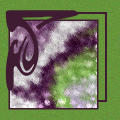Hadith and Sunnah
[What is hadith?] [What is Sunnah?] [Some thoughts on Hadith] [Hadith Checklist] [Hadith Collections] [Articles]

















The Arabic word hadith means "reported speech." (1) In Islam hadith refers specifically to the teachings, actions and sayings of the Prophet Muhammad (Peace be Upon Him), which were passed on verbally by his contemporaries and later collected and written down.
![]()
The Arabic word sunnah means "a form, the customary practice of a person or group of people."(2) In Islam sunnah is used to
refer to the practice of Prophet Muhammad (pbuh), which other believers should try to live by and emulate.
The Sunnah is the second
source of Islamic law and compliments the laws put forth in the Quran.
Prophet Muhammad (pbuh) is reported to have said:
"I have left two matters with
you. As long as youhold them, you will not go the wrong way.
They are the book of Allah and the Sunnah of His Prophet."(3)
The Quran also tells us (translation by Yusuf Ali):
O ye who believe! Obey Allah, and obey the Messenger, and those charged with authority among you. If ye differ in anything among yourselves, refer it to Allah and His Messenger, if ye do believe in Allah and the Last Day: That is best, and most suitable for final determination. (4:59)
Ye have indeed in the Messenger of Allah a beautiful pattern (of conduct) for any one whose hope is in Allah and the Final Day, and who engages much in the Praise of Allah. (33:21)
![]()
The following are some personal thoughts of mine and should only be taken as such. If I am wrong in anything I write I ask Allah to guide me to the truth.
It was not until after I converted that I realized the strong emphasis many
Muslims place on hadith, and that realization both scared me and
disappointed me. Why you may ask? Simply put it
was because I saw a lot of similarity between the hadith collections and
the Bible. Both collected and written down by men long after the
events they deal with took place. I had rejected the Bible, in great
part because of these two facts, so it was hard for me to accept the
importance of hadith, especially in making laws regarding what is
obligatory or forbidden, because of these similarities with the Bible.
However, as I have learnt more, I have come to understand and apreciate
the importance of hadith as a complimentary source to the Quran. The
hadith can provide explanations of the revealed word of God in the Quran
and thus help us understand teh Quran better. However, we must
always remember that the Quran is the revealed word of God, while the
hadith are collections of sayings and doings collected and written down by
men. Therefore I believe that it is important to view the hadith
critically and study them carefully (their classification, context etc.)
and most importantly, always remember that the Quran, as the revealed word
of God, comes first, and a hadith can never contradict the Quran. A
hadith that contradicts the Quran can not be valid.
Below you will find tools to help you examine and evaluate hadith as well
as resources regarding hadith and sunnah. I hope they prove to
be useful:-)
![]()
I got this checklist from a mailing list I am on and I think it is useful to have at hand when looking at hadiths and trying to understand
them. It can be used to argue both for and against a hadiths validity, hopefully more often for them than against them:-)
1. Is the chain of transmitters sound?
2. Is the text in agreement with letter and spirit of the Qur'an?
3. Is the text in agreement with the well-known practice, teaching,
attitude and character of the Prophet (s)?
4. Is the text in agreement with reason, facts and experience?
5. Is the text free of anachronisms, contradictions and
inconsistencies?
6. Is the text free of vulgar expressions that the Prophet (s) would
never have used?
7. Is the context sufficiently known?
![]()
There are a number of different Hadith collections available, which have been collected by different scholars at different times
and in many cases they have used different criteria for including a hadith in their collection. Generally the most authentic
collections are considered to be by Bukhari and Muslim, but that does not mean that every hadith in those collections is
faultless
and it does not necessarily mean that a hadith that is not in these collections should be discarded.
Search Hadith Collections
Translation of Bukhari
Translation of Muslim
![]()
The Science of Hadith
The Classification of Hadith
![]()
(1) Farid, Ahmad. Purification of the Soul according to the earliest sources. Al-Firdous Ltd., London, 1993. (p. 168)
(2) Farid, Ahmad. Purification of the Soul according to the earliest sources. Al-Firdous Ltd., London, 1993. (p. 178)
(3) Farid, Ahmad. Purification of the Soul according to the earliest sources. Al-Firdous Ltd., London, 1993. (p. 178)
![]()
These awesome graphics are provided by:










